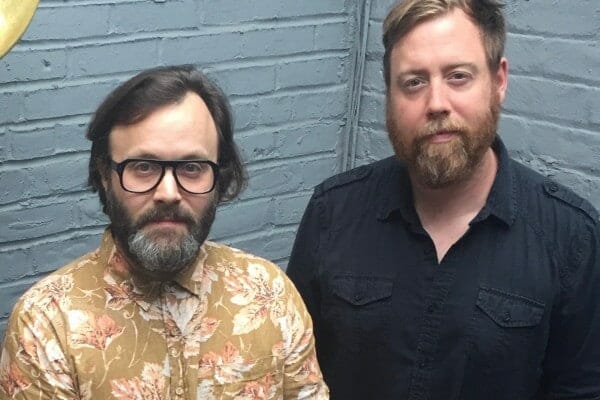Spotlight: The Bogie Band Featuring Joe Russo

When Joe Russo’s Almost Dead played New Jersey’s Wellmont Theater in 2019, Stuart Bogie was waiting backstage to add saxophone to a show-closing take on Bruce Springsteen’s “Born to Run.” At set break, Bogie sheepishly approached Russo with an idea that he’d already been mulling over for a couple of months.
Bogie—a multi-instrumentalist who was an active member of Antibalas for over a decade and has also played with Arcade Fire, TV On The Radio and a number of other top-shelf experimental outfits—had been composing songs for a new horn-based project that he wanted to build around a powerful, propulsive drummer. His longtime friend Russo— they’ve collaborated together in PIRATA, Boyfriends and with Craig Finn—was his first and really only choice. “Joe understands a crescendo and the amassing of kinetic energy in music as good as anybody on our planet,” Bogie says.
He played Russo a demo and, 15 seconds later, the drummer was in. “I’d kill to be in a group with Stuart writing compositions for a big band of horns and me—that’s an absolute dream,” Russo recalls thinking. “I didn’t even need to listen to any of it. Stuart’s a genius: as a composer, as an instrumentalist, as a person. Every bit of him, I’m a fan of. So it was like, ‘Absolutely, man, I’d be honored.”
Bogie, 46, had a specific vision and now he had the drummer who could help him shape it. “I’ve always wanted to make something that drew on all my experiences,” Bogie says. “Doing that intentionally is dangerous, but I had a long talk with myself and a lot of reflection. And I felt that I wanted to make music that nourished a certain part of being alive. I wanted to make music that was useful. It’s about making sonic medicine.”
In 2018, when Bogie first started composing the music that would eventually make up The Bogie Band featuring Joe Russo’s debut LP, The Prophets in the City, he set up a MIDI/ synthesizer station in his Brooklyn apartment. But, he quickly realized that it wasn’t actually the right approach. “Music exists between people,” Bogie says. “I needed to record multiple people at the same time because I’m not just recording that person’s performance—I’m recording the music in between them.”
That ethos took Bogie back to his days in his middle school band in Evanston, Ill., his studies at Interlochen Arts Academy and his time in the symphonic band at the University of Michigan. The twist was fusing that foundation with his Afrobeat expertise, improvisational excursions and a touch of ‘90s hip-hop.
“This thing is really like a school band on acid,” says Russo, who recorded using marching-band-style concert toms. “There are aspects that literally feel like you’re at a pep rally—in a cool way.”
The music is a study in contrasts: at once aggressive and patient, instrumental yet lyrical. It is also simultaneously structured and free-wheeling, equally jubilant and foreboding. “This isn’t music I’ve heard before,” Russo says. “It’s cinematic, it’s playful, it’s serious. It covers all the bases. You feel Stuart’s excitement throughout the whole thing.”
A couple dozen musicians from the expended Antibalas/ Daptone and Red Baraat universes—including tuba player John Altieri, trumpeters Jordan McLean, Michael Leonhart, Dave Guy and Eric Biondo, trombonist Dave “Smoota” Smith and saxophonists Matt Bauder, Ian Hendrickson-Smith, Colin Stetson and Cochemea Gastelum—contributed to The Prophets in the City, which mostly took shape pre-pandemic but kept evolving as the pandemic took hold and the Black Lives Matter movement swelled. (A 10-piece live Bogie Band made their live debut at New York’s Nublu in early 2020.) The title track even weaves in field recordings of the evening cheers for health care and essential workers, captured both in New York and across the pond in the United Kingdom.
“When I put all this music together and I listened to it, I said, ‘What is this music? What is happening here? How is this gonna fit together?’” Bogie recalls. “It’s about a society mounting a revolution of some sort. There’s a story here, and it is a story of change and revolution.”
The Prophets in the City is an instrumental set so the songs’ actual meanings are open to interpretation. But, the way that Bogie sees it, there’s a throughline narrative that reflects on the sweeping changes of recent history. “Something has happened to society in this record,” he says. “We’ve been faced with these intense challenges. There are successes and there’s failures. And they try to come together.”
The eight-and-a-half-minute track “We Organize,” for example, is intentionally the least organized composition on the album. “It’s about the effort of organizing, and how it happens,” Bogie explains. “It’s filled with elation. You kind of have to work at it to get your head around it, and there are too many parts. Democracy is so messy. And that song is very messy.”
“I don’t quite know anybody else that so consistently commits to their musical ideas the way that Stuart does, and sees them through to completion in such a graceful and musical way,” says JRAD’s Scott Metzger, who has known Bogie since his days playing with RANA in the early 2000s.
You can hear the fruits of that commitment on The Prophets in the City, which finds Bogie reaching for something big, bold and beautiful. “I’ve always believed that songs don’t begin and end—we just have a limited experience with them,” Bogie says. “The life of ‘Eyes of the World’ is long, and it’s still alive. And, even if you never heard another version of that, it would still live in your ear. And it would live in your heart. I’m trying to be literal about this, not metaphorical, but I wanted to create musical objects in the psychic sphere and lay them out, channel them into the world and realize them on planet Earth.”



















